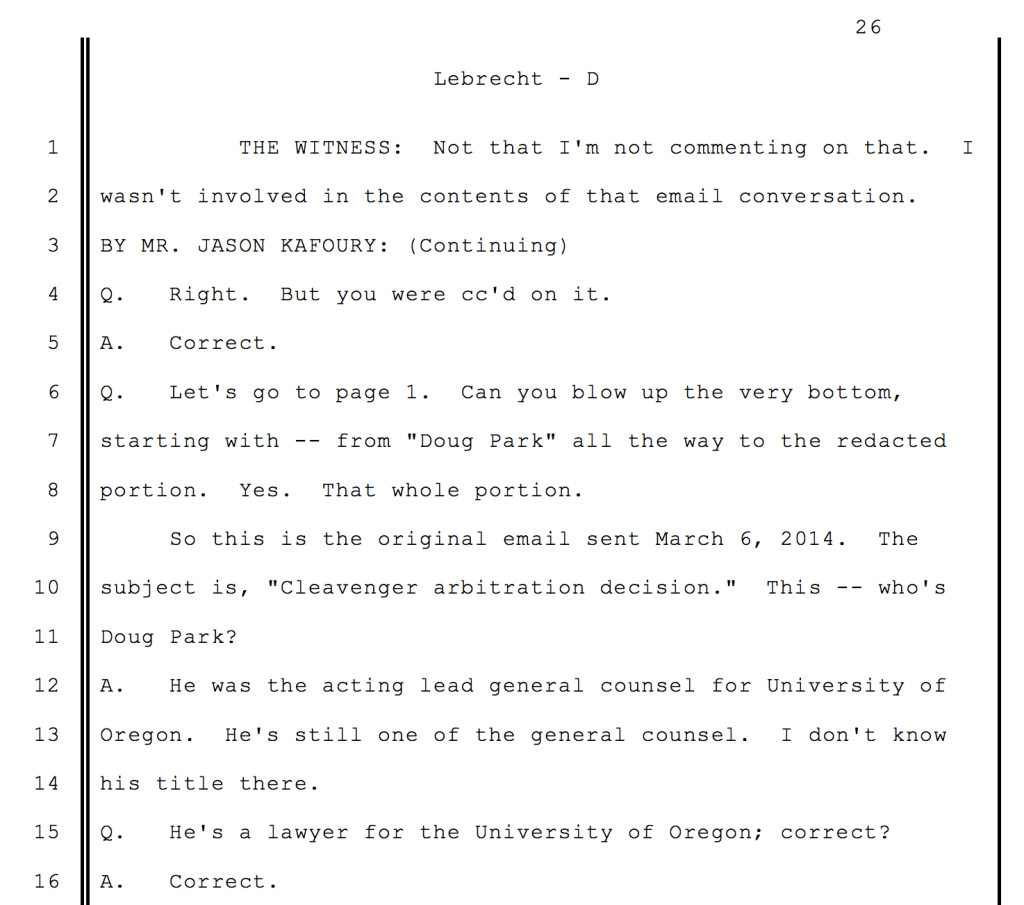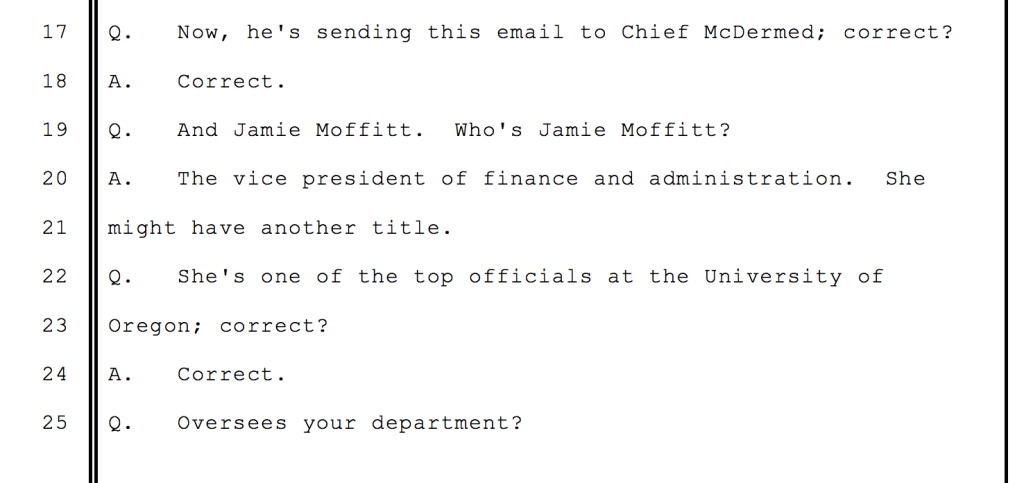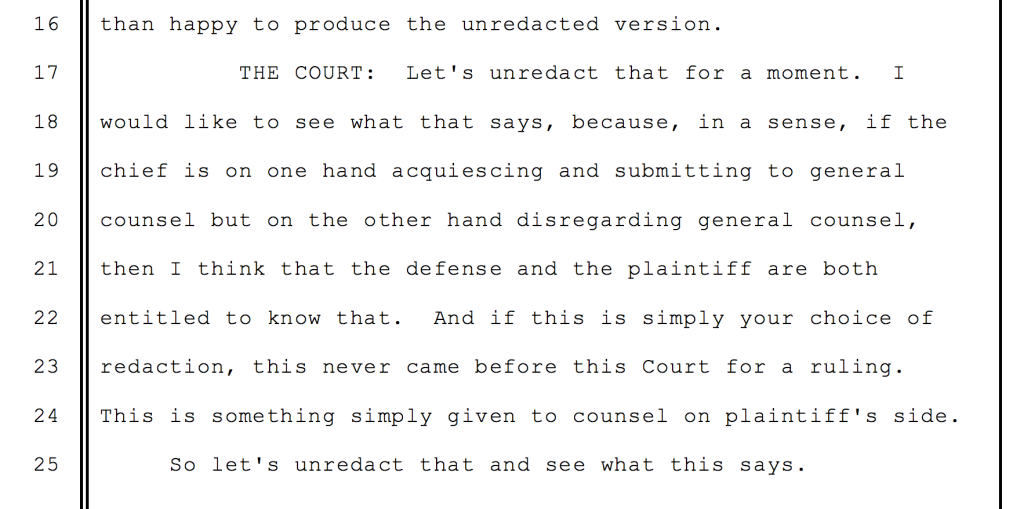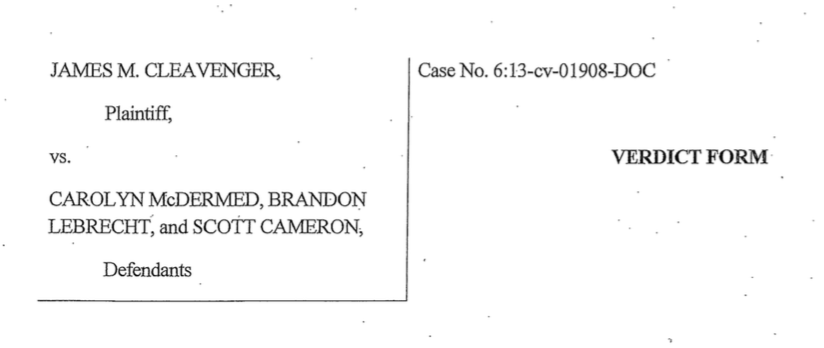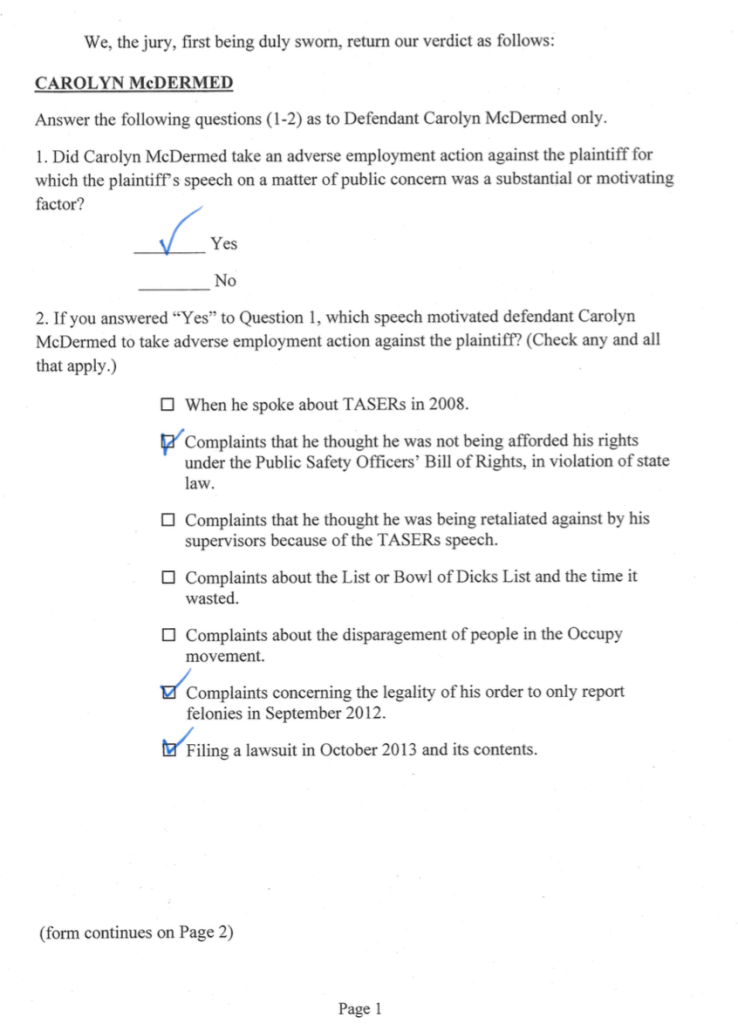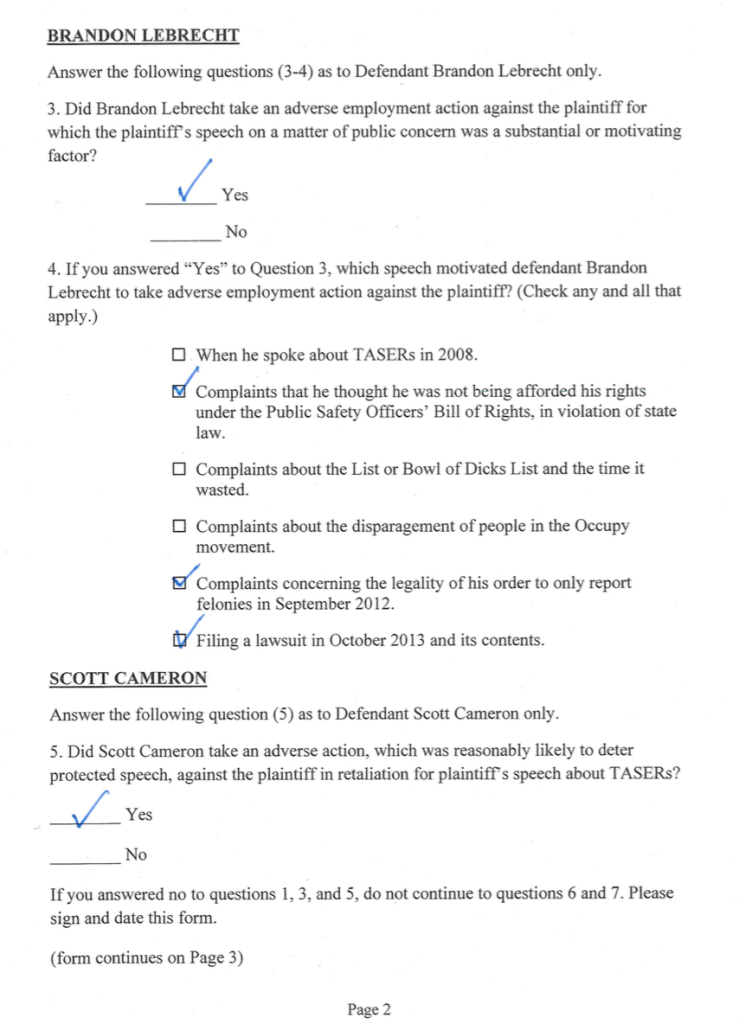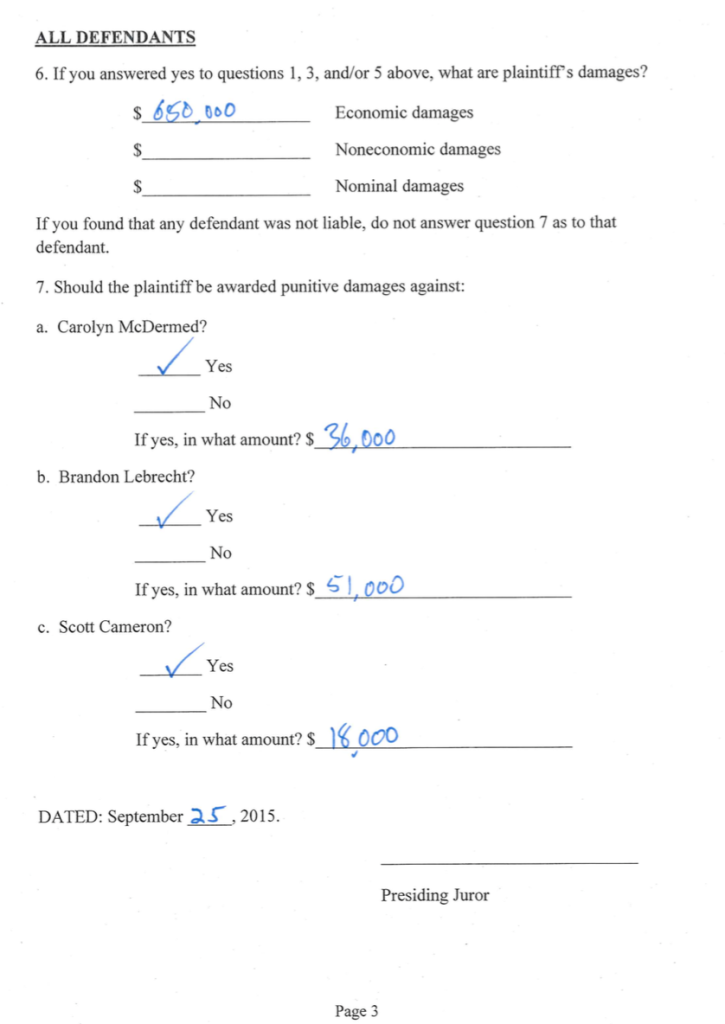12/11/2017 update: “At no time was I, or my agents, made aware of any of the complaints listed in Ms. McCoy’s timeline, with the exception of the dog scratches on the floor in 2015,” he wrote. So the grits were just a decoy. In the end it was all about…
Posts tagged as “Doug Park”
Senator Wyden is gonna be pissed:
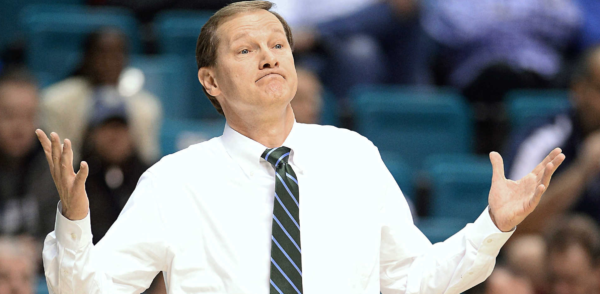
UO student reporter Kenny Jacoby, who broke the story, has the latest scoop in Sports Illustrated here. A snippet:
… According to UO spokesman Tobin Klinger, it is the school’s practice not to notify coaches when student-athletes are accused of sexual assault so as not to risk “tainting investigations.”
Yet Altman’s cell phone records, which SI obtained under the Freedom of Information Act, reveal the coach was enmeshed in Bigby-Williams’s case from the beginning.
In the first 48 hours after school officials learned of the police investigation into Bigby-Williams, Altman had five phone calls with Lisa Peterson, the school’s deputy Title IX coordinator, and another four phone calls with Bigby-Williams’s former coach at Gillette College, Shawn Neary. Both Peterson and Neary had direct knowledge of the criminal investigation into Bigby-Williams, and UO failed to disclose these contacts both to SI and in its letter to U.S. Senator Ron Wyden of Oregon, who demanded more information about UO’s handling of the case in response to SI’s reporting. …
Read it all. Meanwhile there’s an excellent op-ed in the Emerald, asking how it is that Coach Altman’s player never even got called in for a student conduct code investigation despite the rape allegation, while students who disrupted President Schill’s State of the University Address got questioned by the Student Conduct Office for liking the protest on Facebook.
I’d say that there’s plenty here to fire Dana Altman for cause, but instead Rob Mullens will probably give him another raise. Contract here.
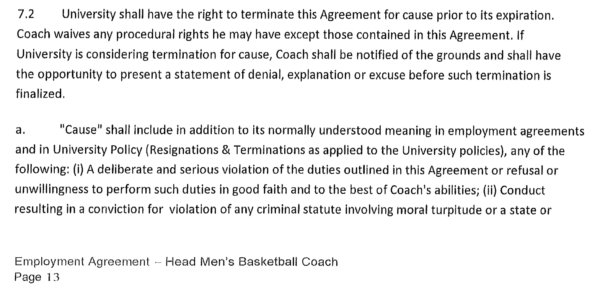
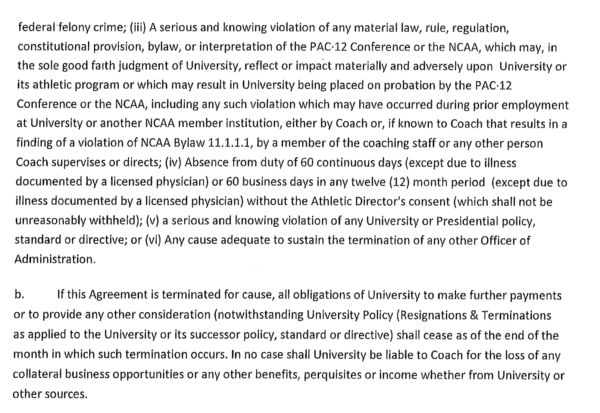
11/4/2017 update:
For the confused, here’s a link to today’s interview with Kenny Jacoby, the reporter who broke this story on OPB’s Think Out Loud. They discuss the incident, where UO’s response went wrong, and the reporter-blaming in UO’s letter to Wyden.
And, from back in 2014, here’s a link to a KATU story on the UOPD’s response to the 2014 incident. The UOPD asked for the EPD report, the EPD detetective said no, and the UOPD detective – the same detective who did not forward the Wyoming police report to the Title IX office this time – congratulated the EPD detective for not giving it to the UOPD, saying
“That was exactly the right decision,” Flynn says in the voicemail, “and what should have been done and we’re trying to keep people from being hysterical over here because they’re being hysterical and wanting to do stupid things.”
True enough.
11/14/2017 update: OSU gang-rape survivor Brenda Tracy not impressed by Schill’s response to Wyden:
8/9/2017: Three years ago yesterday the UO Board of Trustees paid President Mike Gottfredson $940K to leave town immediately. Half up front, the rest within two weeks. In exchange, Gottfredson released UO from all liability related to his brief and disastrous employment as UO President and agreed to pay his own attorney costs, etc:
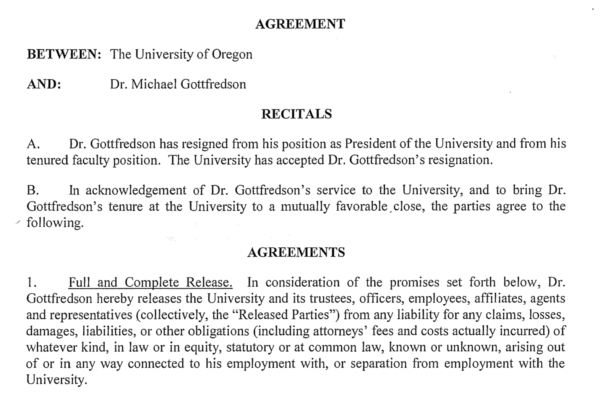
I’m no Harvard law professor, but I think it’s the $940K that makes that a legally enforceable contract, not just a promise:
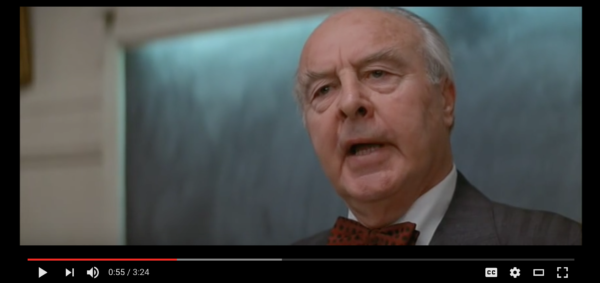
But will UO enforce it?
As reported in this Jack Moran story in the RegisterGuard last month, after winning dismissal of the federal court case by the three former Dana Altman basketball players and alleged rapists who had argued that UO and Gottfredson had illegally ruined their basketball careers by kicking them off the team and campus without due process, the UO General Counsel’s office announced that they would sue the players for legal costs:
The University of Oregon is seeking reimbursement of nearly $53,000 in attorney fees and court costs from three former Ducks basketball players who sued the UO after being kicked out of school following a rape investigation in 2014.
The university on Friday filed a motion for fees and costs in U.S. District Court. The move comes nearly two months after a federal judge dismissed civil lawsuits brought by the players, who were banned from campus for up to 10 years but did not face criminal charges after a female student accused them of sexual assault.
In the request for reimbursement, lawyers for the UO characterize the lawsuits — filed by Brandon Austin, Dominic Artis and Damyean Dotson — as frivolous and unreasonable.
“The university rarely seeks prevailing party fees,” the motion states. “But in this case, plaintiffs pursued claims that lacked any reasonable basis in law or fact, which forced the university to waste considerable public resources.” …
Seems iffy, unless of course you’re one of the Miller Nash Graham & Dunn attorneys that UO is paying by the hour at $350 per. In contrast the contract with Gottfredson is pretty clear cut. So why won’t the UO General Counsel’s office unleash Miller Nash et al to take Mike Gottfredson to court over his share of the Austin et al legal fees?
I don’t know, but there are many more details in the court docket here, including plenty of expensive conversations with “Dr. Gottfredson” in the detailed billing records:

![]()
![]()
![]()
![]()
![]()
8/8/2016: UO to mark 2nd Gottfredson Day with traditional appearance in Federal Court
[Remember the Hat Day is November 21].
From the docket here: ORDER: Granting Defendant’s Unopposed Motion for Extension of Time to Answer 6 . Answer is due by 5/18/2017. Ordered by Judge Michael J. McShane. (cp) (Entered: 04/17/2017) Attorney Shayda Le of Portland’s Barran Liebman law firm is the same lawyer our administration hired, along with partner Edwin Harden, to defend…
Sorry, long post, which includes a letter on internal threats to the principle of shared governance from Professor Emeritus of Biology Frank Stahl, and information on the 2012 threat from the administration to dissolve the UO Senate and Faculty Assembly. Five years ago on Dec 15th 2011 the UO Faculty Assembly ratified…
Actually, after 6 months or so, the Bar’s General Counsel Helen Hierschbiel has decided they aren’t even willing to conduct an investigation. Too bad. Who knows, that might have helped clear Park and Hill’s names:
Online here. I’ll take a guess that he was hoping to talk about his “Oregon Commitment” initiatives, instead of having to rehash and defend Doug Park’s lousy decisions for the nth time: … University of Oregon President Michael Schill defended the university’s actions regarding a December 2014 transfer of medical records from…
11/5/2015: Jake New has the analysis in InsideHigherEd. The start: Last week, Brandon Austin, a former college basketball player, filed a lawsuit against the University of Oregon for $7.5 million, arguing that administrators there violated his rights when they suspended him over his alleged involvement in a gang rape. Austin was…
To be broadcast this Thursday, 10:30AM West Coast time on ESPN’s Outside The Lines. The full broadcast apparently includes an interview with UO counselor Jennifer Morlok, who blew the whistle after UO lawyers Doug Park and Sam Hill got the records of her confidential counseling sessions with Jane Doe, the survivor…
10/24/2015 update: From the Ornstein stories in the Chronicle and ProPublica:
“I don’t blame the University of Oregon for a rape,” she said. “It’s not their fault. I blame them for how they responded to it. I found out months later that every single meeting I had with a therapist, she took detailed notes on, and the University of Oregon had read these notes before I had even seen them.”
And now there’s a Slate op-ed about the reports, here:
Viewing medical records for medical reasons could help a university protect a student at risk of harm. But the University of Oregon’s meddling into Hanson’s private account of her rape would have only helped the university protect itself. The value of therapy lies in the patient’s expectation of confidentiality; if a student thinks her private exchanges with a doctor could resurface in the office of a university administrator, helping her heal will be much harder. A therapist’s office can be one of the only safe spaces available to a rape survivor on a college campus. Exploiting that trust to try to avoid paying a legal settlement is a cynical maneuver that can only exacerbate an already-low rape reporting rate.
The Jane Doe records seizure happened on Doug Park and Sam Hill’s watch. The Hanson incident apparently took place while Randy Geller was GC. I think the correct phrase here is “institutional betrayal”.
10/23/2015: Chronicle and ProPublica report on UO counseling record confidentiality
Reporting by Charles Ornstein, here. He picks up on the report first made in the Eugene Weekly in May by Camilla Mortensen, below. (Without citing her – wow is that bad form.)
Ornstein gets Doug Park to offer a complete and utter apology for the UO General Counsel Office’s behavior in these two cases:
10/9/2015: Just some of the questions raised by the Bowl of Dicks trial transcripts.
I’ve never looked at trial transcripts before, but if reading the good work of the Honorable Judge David O. Carter presiding doesn’t restore a little faith in the American judicial system and give you a few laughs along the way then you are a worse cynic than I am.
How did Johnson Hall let the incompetence, harassment, retaliation, and backstabbing revealed in these transcripts go on for years? These people call themselves leaders? How many careers have been ruined on their watch?
Here are the trial transcripts. The docket, here, lists who is testifying on which day.
FINAL-MINI-9-9-15-Carter-CV-1-Trial
FINAL-MINI-9-10-15-Carter-CV-Trial Day 3
FINAL-MINI-9-11-15-Carter-CV-Trial Day 4
FINAL-MINI-9-14-15-Carter-CV-Trial Day 5
FINAL-MINI-9-15-15-Carter-CV-Trial Day 6
FINAL-MINI-9-16-15-Carter-CV-Trial Day 7
FINAL-MINI-9-21-15-Carter-CV-Trial Day 8
FINAL-MINI-9-22-15-Carter-CV-Trial Day 9
FINAL-MINI-9-23-15-Carter-CV-Trial Day 10
FINAL-MINI-9-24-15-Carter-CV-Day 11-1
FINAL-MINI-9-25-15-Carter-CV-Trial Day 12-Verdict
And some excerpts:
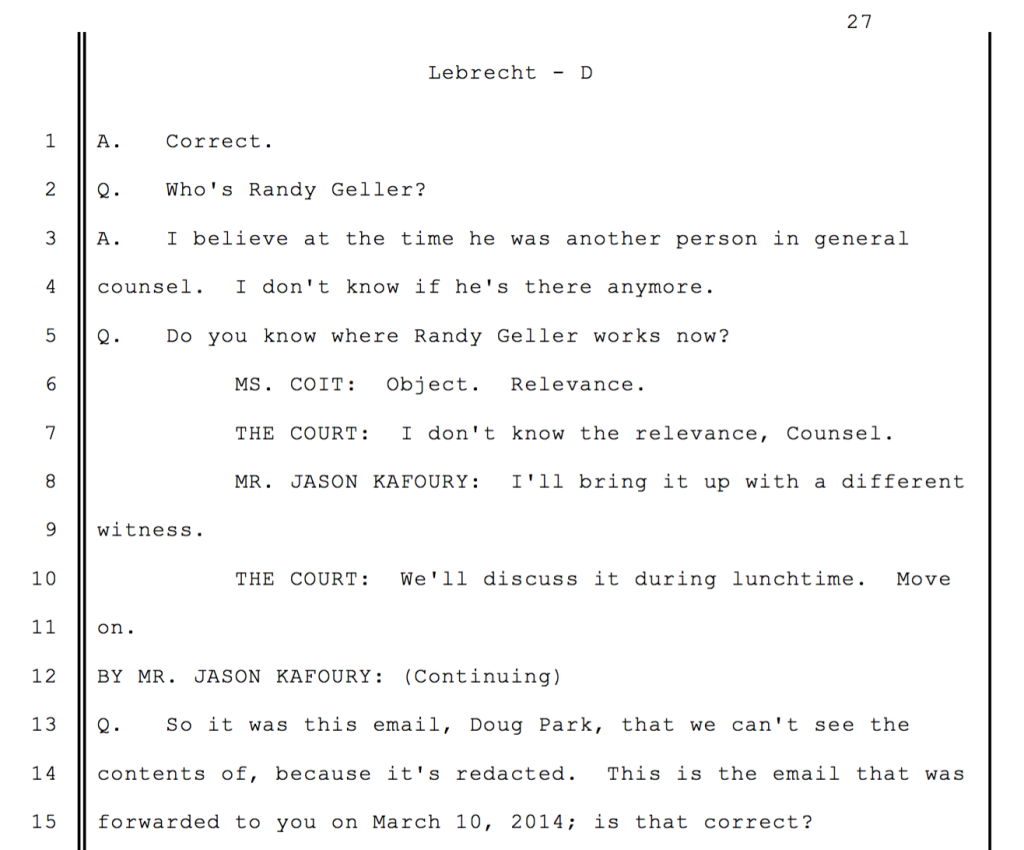
UO General Counsel Randy Geller was fired resigned to spend more time with his family during the midst of the basketball rape allegation cover-up. He now works at HLGR with Andrea Coit. Not hard to imagine why she wouldn’t want the jury to know that.
And was UOPD Chief Carolyn McDermed’s retaliation against former officer James Cleavenger done against the advice and without the knowledge of former UO GC Randy Geller and former interim UO GC Doug Park? Or did the retaliation occur on their advice? With their knowledge? Did they give the full facts to Lane County DA Alex Gardner when he was considering Brady Listing James Cleavenger?
The court wants to know, but as it happens Andrea Coit, the HLGR lawyer, has redacted a key document. Funny how often that happens here at UO, but Judge Carter is not amused:
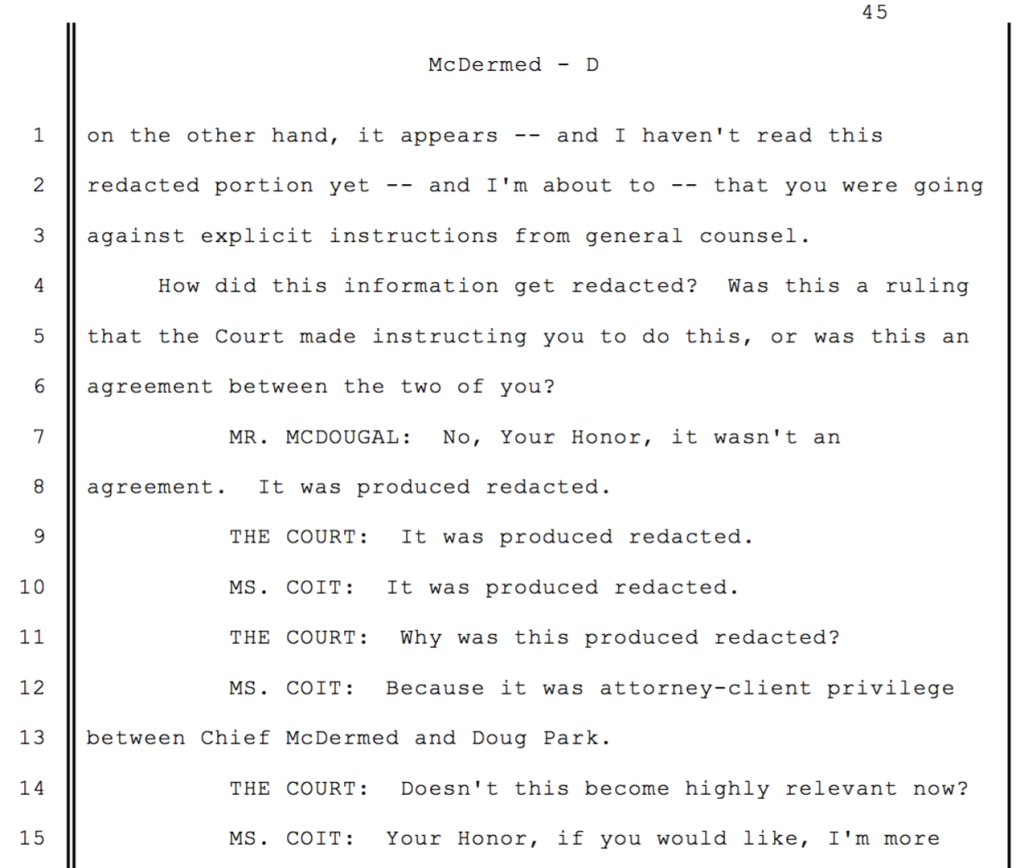
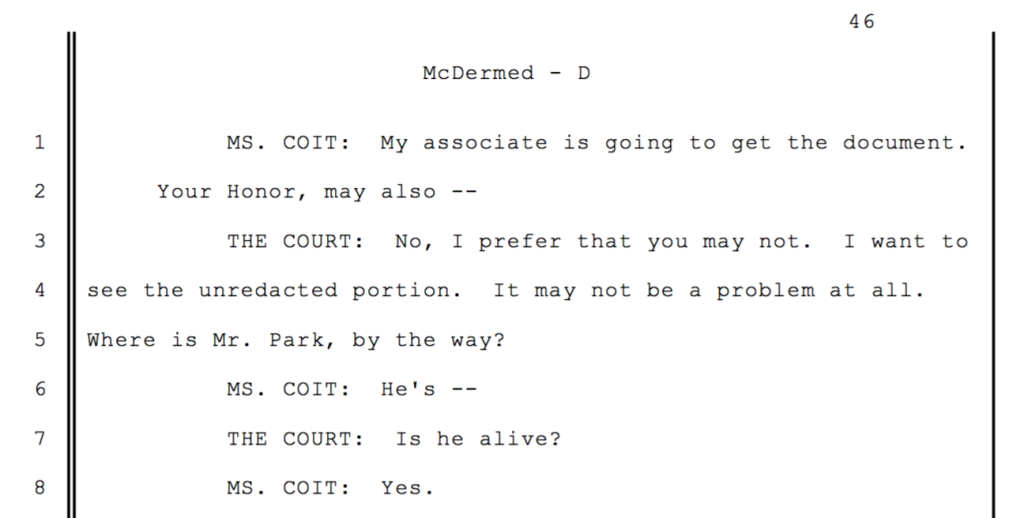
Alive but conveniently not in court, lest Judge Carter haul his ass onto the witness stand and swear him in.
So did Randy Geller and Doug Park know what Chief McDermed was up to with the retaliatory Brady listing? I’ll be damned if I can figure that out from these transcripts. Comments welcome.
9/29/2015: Kafoury and McDougal accuse Doug Park and HLGR of participating in UOPD retaliation against Cleavenger
I don’t know if this would be a violation of the Bar’s ethics rules. From the website of the Kafoury and McDougal law firm that won the Cleavenger case:
Today, a federal jury in Portland awarded $755,000 to James Cleavenger, a former public safety officer at the University of Oregon who claimed retaliation and loss of his law enforcement career at the hands of the University of Oregon Chief of Police and two commanders. The jury found that defendants Chief Carolyn McDermed, Lt. Brandon Lebrecht, and former Sgt. Scott Cameron violated Mr. Cleavenger’s First Amendment free speech rights for speaking out on police policy and matters of public concern, of which his superiors disapproved.
As a University of Oregon law student in 2008, Cleavenger spoke out against arming the University of Oregon officers with tasers without proper training and a use of force policy with input from the campus community. Evidence at the trial showed that defendants resented his comments at the time, were baffled that he was later hired by the department, and the jury found that because of his taser speech this lead to papering his file and terminating him. The jury also found Cleavenger was secretly placed on the Lane County District Attorney’s “Brady List,” a process which blacklists officers found to be “dishonest,” effectively ending an officer’s law enforcement career.
Attorneys including Doug Park, University of Oregon’s Acting General Counsel, participated in the decision to “Brady List” Mr. Cleavenger. The University of Oregon was represented by Andrea Coit of Harrang Long Gary Rudnick P.C. in Eugene, who participated in the efforts to have Cleavenger “Brady Listed.” The decision to “Brady List” Cleavenger came immediately upon the heels of the decision by a neutral arbitrator that Cleavenger’s firing was improper and that he was entitled to reinstatement. The arbitrator further rejected all of the department’s accusations of dishonesty by Cleavenger. Despite the Arbitrator’s decision, UOPD tried to renew these claims of dishonesty by Cleavenger without providing the DA the Arbitrator’s actual decision, in a deliberate attempt to try to block Cleavenger’s reinstatement and in retaliation for Cleavenger filing his lawsuit.
9/25/2015: It’s not about the Bowl of Dicks: Jury awards Cleavenger $650K+$105K punitive damages
It’s about the UOPD’s retaliation against him for exercising his 1st Amendment rights. He’d only asked for $400K.
Testimony showed UO’s Interim GC Doug Park was also involved in Cleavenger’s firing and knew about the UOPD’s retaliation efforts though he was not a defendant. Cleavenger has another case against UO pending in state court. The Oregonian’s Betsy Hammond elaborates on the involvement of Park and others, in the comments on her story on the verdict:
There was extensive testimony and documentary evidence about the role that Linda King, Brian Smith, Doug Park and others played in giving the officer written notice spelling out why he was going to be fired, in holding meetings and hearing on his discipline, in putting written materials into his file, etc. Chief McDermed testified she ran the Brady listing plans past Doug Park.
No info yet on how much Andrea Coit and Jonathan Hood will earn from losing this case, but HLGR typically charges ~$300 an hour. That’s a lot for lawyers who manage to lose a case so badly the jury awards more than the plaintiff asked for.
While UO claimed that insurance would pay for the lawyers and damages, that does not appear to be true – we’re in the PURMIT risk pool with the other state universities.
The report from Betsy Hammond is in the Oregonian here. A snippet:
“This is a victory for every honest police officer,” said Jason Kafoury, Cleavenger’s lead lawyer. “The jury today honored and enforced an officer’s right to speak freely on matters of public concern, regardless of whether their superiors approve.”
University of Oregon spokesman Tobin Klinger said Friday morning he needed additional time to provide the university’s perspective on the legal defeat.
Actually, Duck Advocate Tobin Klinger’s perspective on this First Amendment case is already on the record, in a letter to the editor he sent to the RG shortly after getting hired by UO for $115K to manage relations with the press and reading Diane Dietz’s July 11th 2014 story on the Bowl:
Story aimed for shock value
I’m a recent transplant to Eugene, having spent a majority of my adult and professional life working with media in northwest Ohio.
Like many, I idealized life in the Pacific Northwest. Eugene and its people have lived up to my vision. Eugene is access to independent film, unique foods, outdoor activities, cultural happenings and community pride.
I don’t know that this shines through on the pages of The Register-Guard, particularly with the sophomoric “reporting” of Diane Dietz.
I admit to having a bias. Dietz covers my employer, the University of Oregon. In my role as head of UO public affairs communications, it is my job to defend the integrity and the reputation of the university. I advocate for faculty, staff, students, administration and athletics. I advocate for the Ducks.
Earning positive attention is a challenge with a reporter who is more interested in pandering to the lowest common denominator than demonstrating the value of higher education. Where else would you see the phrase “bowl of —–” five times in a single news article (Register-Guard, July 11)? This obvious play for shock value diverted attention away from the fact that the reporter waited 26 paragraphs before sharing important details from the university.
Moreover, this same newspaper in February dedicated significant space to a major Sunday story that used a blatant stereotype of Chinese students as its primary theme.
Even though I’m new here, I’m certain this community deserves better.
Tobin Klinger, Senior director Public Affairs Communications, University of Oregon, Eugene
So it’s not exactly a mystery why UO’s relationship with the press has gone from bad to worse under Klinger. The First Amendment is our lowest common denominator? Continuing with Hammond’s report:
The jurors found McDermed violated Cleavenger’s First Amendment rights when she fired him in 2012, then again in 2014 when she and Lebrecht created a huge, potentially career-ending dossier designed to prove Cleavenger was too untruthful to testify in court.
Jurors ironically decided that it was McDermed who most likely lied under oath when she testified that she ordered creation of that dossier because she was worried Clevenger was a danger to himself and other officers, not because he complained to her superiors and filed a lawsuit that made her and her department a national laughingstock.
And then:
The UO’s top lawyers and human resources officials were intimately involved in the decision to fire Cleavenger, and McDermed testified Douglas Park, then UO’s No. 2 in-house lawyer, knew she was going to try to get Cleavenger on the Brady list. Since then, Park was promoted on an interim basis to UO’s top interim lawyer, but he is slated to return to the No. 2 job when a permanent successor takes over in about a week.
Kafoury said, “It’s a disgrace that the attorneys for the university were in on the decision to Brady list and ruin Clevenger’s career” while defending UO against a lawsuit alleging retribution for whistleblowing.
And then:
Cleavenger also brought to light the department’s petty, vindictive management style and the lack of professional training and record-keeping. Although he had been UO’s most productive safety officer, McDermed eventually ordered Cleavenger, via an intermediary, not to report any crimes except felonies – an order that appears to violate a high-profile federal campus safety law.
The verdict is in:
9/24/2015: Harrang lawyers claim Bowl of Dicks not “a matter of public concern”, judge disagrees
The Honorable David O. Carter must have an art history degree. He rejected HLGR’s last minute plea, apparently without snickering, and the jury is now deliberating. Docket here.
9/23/2015: HLGR lawyers claim Bowl of Dicks not “a matter of public concern”
That’s what they want the judge to tell the jurors when they get the case in the next day or two. The complaint from UO’s HLGR lawyers about the judge’s proposed jury instructions is below.
Given the large public response to the press coverage of this case – Tobin Klinger chimed in too – this argument ignores the foundation of modern economics, Paul Samuelson’s Weak Axiom of Revealed Preference. It also contradicts the “De gustibus non est disputandum” work of two other Nobel Prize winners, George Stigler and Gary Becker.
So maybe HLGR’s lawyers majored in literature, not economics? It’s news to me, but wikipedia says that the modern meaning of the phrase comes from Fyodor Dostoyevsky. OK, so not every lit major makes it through The Brothers Karamazov.
Or maybe they were Art History majors? Apparently not. One of the most celebrated works of famed Renaissance artist Francisco Urbini is, yes, a Bowl of Dicks. The BBC – how’s that for classy – has the report here.
Sorry, but the public is plenty interested in the bowl, dicks, and the First Amendment and retaliation issues the combination has raised, as Diane Dietz explains very well in the RG, here.
The BBC:
Yes, I bet it was. Probably a lawyer. The great thing about great art is its timeless relevance to our daily lives.
Here’s HLGR’s plea to the judge for a change in the jury instructions:
I’m no law professor, but this policy seems to put to rest worries that UO will ever again access confidential student counseling records for questionable purposes. It’s also notable in that the Oregon Bar ethics complaint against UO Interim General Counsel Doug Park and Associate General Counsel Sam Hill for obtaining the records, and…
That’s the report from a normally well informed source. (Now confirmed, see below for the report). Today the Oregon Board of Psychologist Examiners imposed a $5,000 fine on Dr. Shelly Kerr, Director of the University of Oregon Counseling and Testing Center, for actions relating to the transfer of counseling records to…
8/21/2015: Diane Dietz of the RG has more, here: UO psychology professor Jennifer Freyd, who pushed to make the UO counseling center records private, said she was “very, very pleased” with the Education Department’s guidance. “They’ve gone a long way to clarifying the situation,” Freyd said Thursday. “The only way people…
Updated with the UCLA Chancellor’s message. Resume and cover letter here, Info on the searches here. President Schill’s announcement: Colleagues, It is a distinct pleasure to share with you today that Kevin Reed has accepted the role of vice president and general counsel. He will play a critical role as chief…

